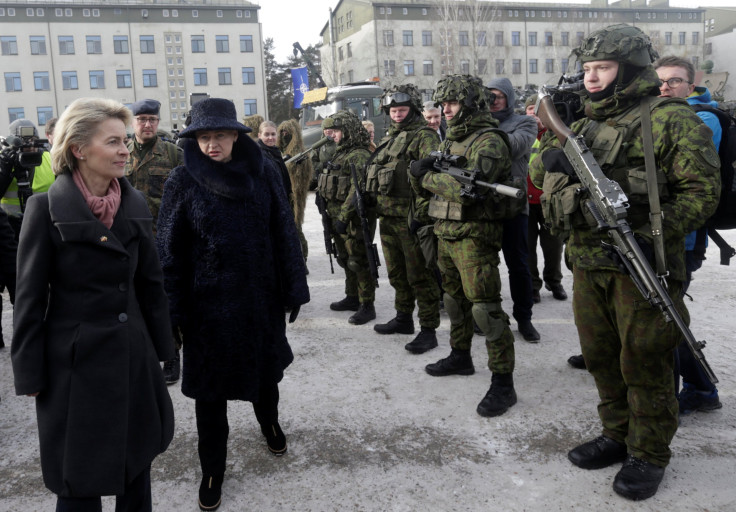War In Europe? Germany Sends NATO Troops To Russia's Baltic Borders As Military Dispute With Moscow Escalates

Germany sent several hundred troops to Lithuania Wednesday as a contribution to a NATO-led effort designed to counter what the international alliance perceives as a military threat from Russia.
The mission, to which NATO agreed last year, would see the mass mobilization of 200 vehicles, including 30 tanks, and 450 soldiers to the Baltic State, which is flanked on both sides by Russian borders. By spring, Germany was expected to head an international battalion of some 1,200 soldiers from NATO members such as Belgium, France and the Netherlands. They were all dedicated to keeping an eye on what they say is Russian aggression amid one of the tensest periods of relations between Russia and NATO. Lithuanian President Dalia Grybauskaite called Russia's behavior "an ongoing military buildup around our borders and aggressive actions in our region," according to European news outlet The Local.
Moscow has rejected NATO's narrative, which originated from Russia's annexing of the former Ukrainian territory of Crimea in 2014 and has been further influenced by Russia's support for separatist rebels in eastern Ukraine. Russia has maintained that NATO, of which U.S. is by far the largest financial sponsor, threatened Russian sovereignty by organizing Russia's neighbors against it. Both NATO and Russia have undergone the largest parallel military escalations since the Cold War, including the deployment of nuclear-capable missiles and multiple violations of airspace.
Lithuania, along with Estonia, Latvia and Poland, have been designated by NATO as the strategic venues for four major battle groups organized along Russia's borders. Lithuania was bordered by Russia's mainland on the east and Russia's enclave coastal territory, Kaliningrad, on the west. Moscow has increasingly militarized Kaliningrad in response to what it says are NATO's attempts to neutralize Russia's military defense capabilities.
"We perceive it as a threat. These actions threaten our interests, our security. Especially as it concerns a third party building up its military presence near our borders. It’s not even a European state,” Dmitry Peskov, the spokesperson for Russian President Vladimir Putin, said in his January response to NATO's announcement of plans to deploy in Lithuania.
Former President Barack Obama was a vocal critic of Russia's foreign policy ambitions and censured Moscow on its intervention in conflicts in Ukraine and Syria. During his administration, he supported bolstering NATO's forces in Europe. Obama's successor, President Donald Trump has voiced support for Russia's initiatives abroad and vowed to restore good relations between Washington and Moscow. While his choice for Defense Secretary, James Mattis, has reassured NATO leadership of the U.S.' continued commitment, Trump has called the military alliance "obsolete" and demanded allies to increase their financial contributions to the international defense organization.
© Copyright IBTimes 2025. All rights reserved.





















